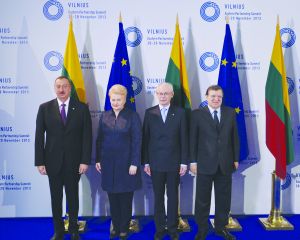
Azerbaijan After Vilnius Summit: More Questions than Answers
Publication: Eurasia Daily Monitor Volume: 10 Issue: 219
By:

On November 29, Azerbaijan and the European Union signed a visa-facilitation agreement in Vilnius, Lithuania, within the framework of the Eastern Partnership summit. The agreement was signed by the foreign minister of Azerbaijan, Elmar Mammadyarov, by Linas Linkevicius, Minister of Foreign Affairs of Lithuania in his capacity (July 1–December 31, 2013) as President of the Council of the European Union, and by Stefan Fule, the EU’s commissioner with responsibility for enlargement and the European Neighborhood Policy (Contact.az, November 29). The agreement will help Azerbaijani citizens to obtain an EU visa more easily and more cheaply.
In particular, the signed agreement has loosened the requirements for obtaining a short-stay visa to travel to and freely throughout the EU. Short-stay visas allow for an intended stay of no more than 90 days in any period of 180 days. For some categories of frequent travelers and under certain conditions, EU member states are supposed to issue multiple-entry visas with validity from one to up to five years. Holders of diplomatic credentials are entirely exempted from the visa obligation (Trend.az, November 29).
In addition, Azerbaijan joined all the other countries of the Eastern Partnership in signing a joint declaration that calls for further steps toward strengthening democracy, respect for human rights and the rule of law, support for the continuation of political and economic reforms, as well as the development of trade relations (https://www.consilium.europa.eu/uedocs/cms_data/docs/pressdata/EN/foraff/139765.pdf). Special attention was given in the joint declaration to the development of the Southern Energy Corridor as well as the construction of the Trans-Adriatic Pipeline (TAP) for natural gas and the Azerbaijan–Georgia–Romania Interconnector (AGRI) project. Moreover, the sides welcomed the recent meeting of the presidents of Armenia and Azerbaijan in Vienna under the Minsk Group format (APA, November 30).
The authorities in Azerbaijan have positively assessed Azerbaijan’s orientation toward Europe, but maintain certain reservations about further movement in this direction. Novruz Mammadov, the deputy head of the Azerbaijani presidential administration, stated that Baku had informed Brussels of his country’s inability to sign an Associative Agreement with the EU. “We want to prepare a document that adequately [reflects] our relations with the EU,” he said (Contact.az, November 29). Earlier, European officials had accused Baku of ignoring its responsibilities and obligations within the framework of the Eastern Partnership. However, Azerbaijan had stated that it was ready to cooperate with the EU in the economic sphere but did not want to undertake any political obligations (Zerkalo, November 30).
In fact, Azerbaijan’s trade and economic relations with EU countries are already significant. EU member country investments in Azerbaijan’s non-oil sectors made up 36.5 percent of total investments in 2012. Shahin Mustafayev, the Azerbaijani minister for economic development, stated during the summit in Vilnius that the EU’s share in Azerbaijan’s trade comprised 41 percent in 2012. There are around 1,122 EU companies registered in Azerbaijan, which operate in agriculture, banking, transport and other areas of the economy (Zerkalo, November 30).
The results of the EU summit in Vilnius, nonetheless, highlighted the fact that Azerbaijan is in a difficult situation between Russia and Europe, while the rest of the South Caucasus appears to be moving in opposing directions geopolitically. Armenia earlier agreed to join the Custom Union (CU) of Russia, Belarus and Kazakhstan, at the expense of closer ties to the EU (see EDM, September 5, 6, 11, 18), whereas Georgia initialed the Association Agreement with the European Union at the Vilnius summit (see EDM, December 2). Azerbaijan, on the other hand, is trying to maintain its neutrality for as long as possible. With further intensification of the struggle between the EU and the CU in the former Soviet space, however, Baku will have an increasingly difficult time keeping this balance; arguably, the country will eventually need to make a choice. Each of the choices brings its benefits and problems. And none of the options offer Baku a pure win-win situation.
Meanwhile, recent events in Ukraine show that Russia is serious about its interests and is ready to undermine any initiatives that would try to bring former Soviet republics into the EU’s orbit (see EDM, November 5). For the moment, Azerbaijan’s neutrality satisfies Russian interests, but Moscow will continue to press Baku to join the Customs Union and, later, the Eurasian Union.
Taking all these facts into consideration, Azerbaijan is left with no options other than to delay its decision to join EU-led projects for as long as possible. Arguably, Azerbaijani elites understand that the future of their country is connected with Europe and its values. Sooner or later, the country will proceed with deeper cooperation and integration with Europe. Nevertheless, today’s Russia is stronger than it has been in over 20 years. Baku cannot simply ignore Moscow’s interests or unilaterally act against the Kremlin’s will. The Azerbaijani government, therefore, hopes that the best strategy is to win time until the CU discredits itself economically and politically. Depending on the amount of pressure it faces from Moscow in the near to medium term, Baku may be forced to sign some sort of political declaration to keep its markets tied to Russian goods and services. However, once the Trans-Anatolian Pipeline (TANAP) and TAP are constructed and brought online, Azerbaijan will become a vital partner for the European Union and a major contributor to Europe’s energy security as a natural gas supplier. At that point, Baku may be able to expect of Brussels certain necessary political and security guarantees, thus enhancing its freedom of maneuver to join further EU-led agreements and projects. Until that time, Azerbaijan is forced to walk a thin line while its mighty northern neighbor attentively watches this South Caucasus country’s every step.




